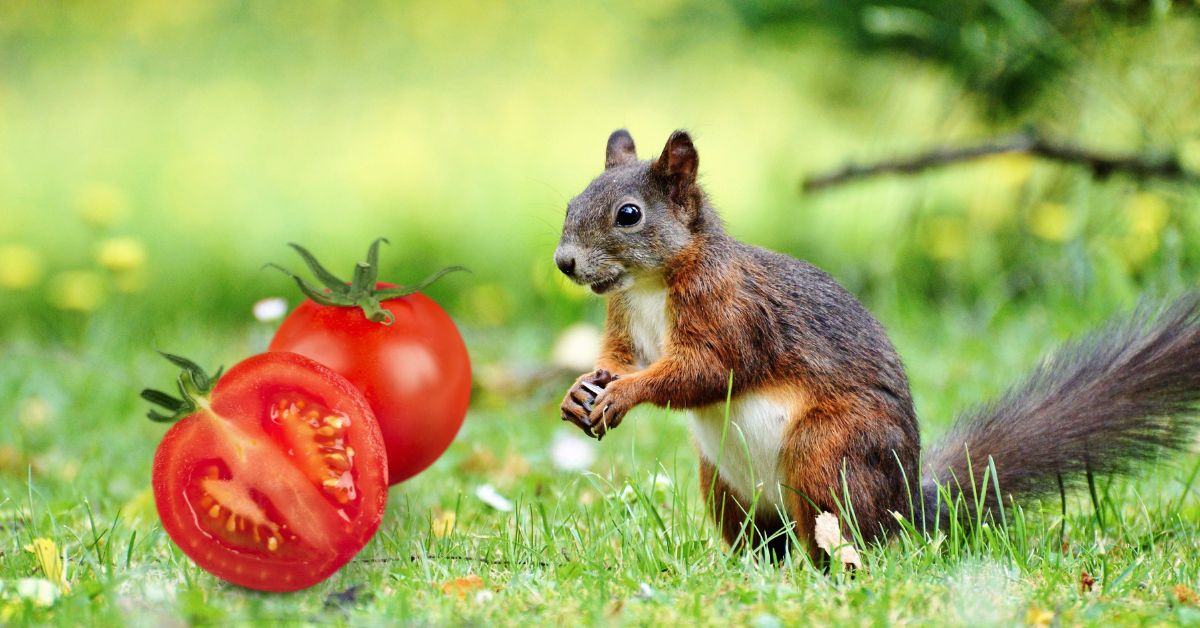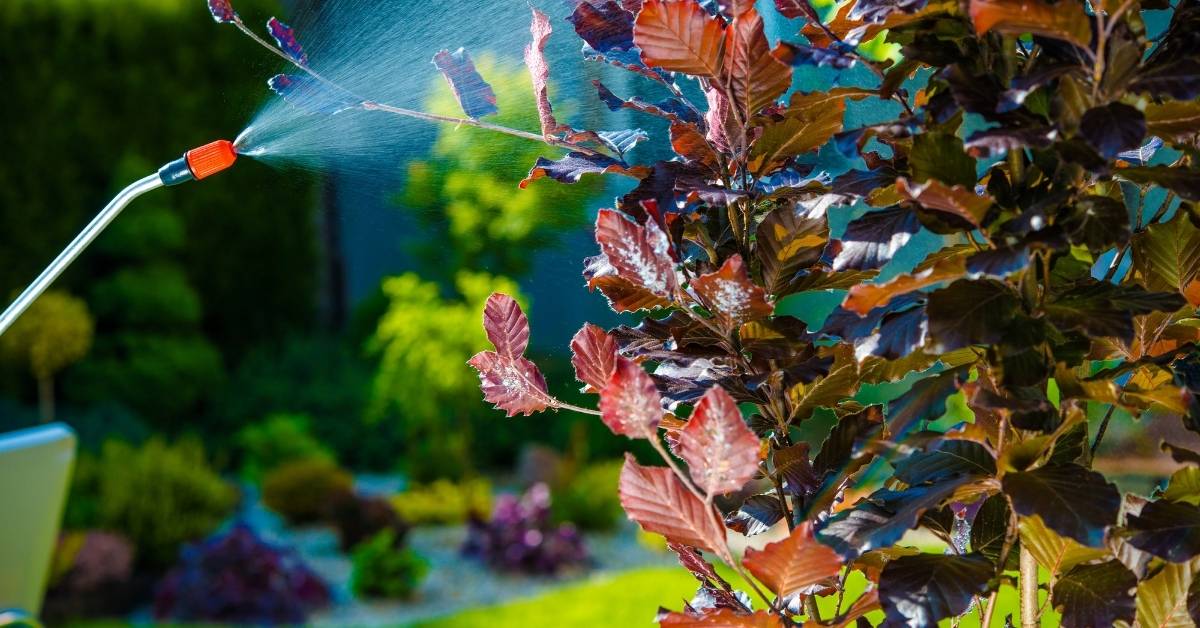Growing your own tomatoes is one of the joys of gardening. There’s nothing quite like biting into a juicy, ripe tomato that you’ve nurtured from a tiny seedling. But as any gardener knows, there are challenges to overcome along the way – and one of the biggest challenges can be squirrels. That’s why I decided to write about how to protect tomato plants from squirrels.
I’ll never forget the frustration I felt last summer when I discovered that squirrels had decimated my tomato plants overnight. All the hard work I’d put in planting, watering, and weeding seemed to have been for nothing. But after doing some research and talking to other gardeners, I learned that there are effective ways to protect tomato plants from these pesky critters.
That’s why I’m excited to share this article with you today. Whether you’re a seasoned gardener or just starting out, you’ll find expert tips and tricks for keeping squirrels away from your tomato plants. From natural deterrents to physical barriers, there are plenty of options to choose from. So let’s dive in and make sure those squirrels don’t get the best of us in 2023!
Do squirrels eat tomatoes?
The answer is yes, they do. Squirrels are omnivorous animals that eat a variety of foods, including nuts, seeds, fruits, vegetables, and even insects. Tomatoes are one of their favorite foods because they are juicy, sweet, and easy to access. Squirrels can smell ripe tomatoes from a distance and will climb fences, trees, or poles to reach them.
They will either bite off a chunk of the tomato and leave the rest behind or carry the whole fruit away to their nest. Squirrels can cause significant damage to your tomato plants, especially if you have a large population of them in your area. That’s why it’s important to take measures to protect your plants from these hungry rodents.
How to Protect Tomato Plants From Squirrels in 2023: Expert Tips
Is it true that squirrels eat your tomatoes? They surely do, and if you’ve ever had your tomatoes stolen by squirrels, you’re probably wondering how to protect tomato plants from squirrels in your garden.
Here you will figure out the signs of squirrel activities and how to easily get rid of them in your garden.
How can you know whether there are squirrels in the garden?
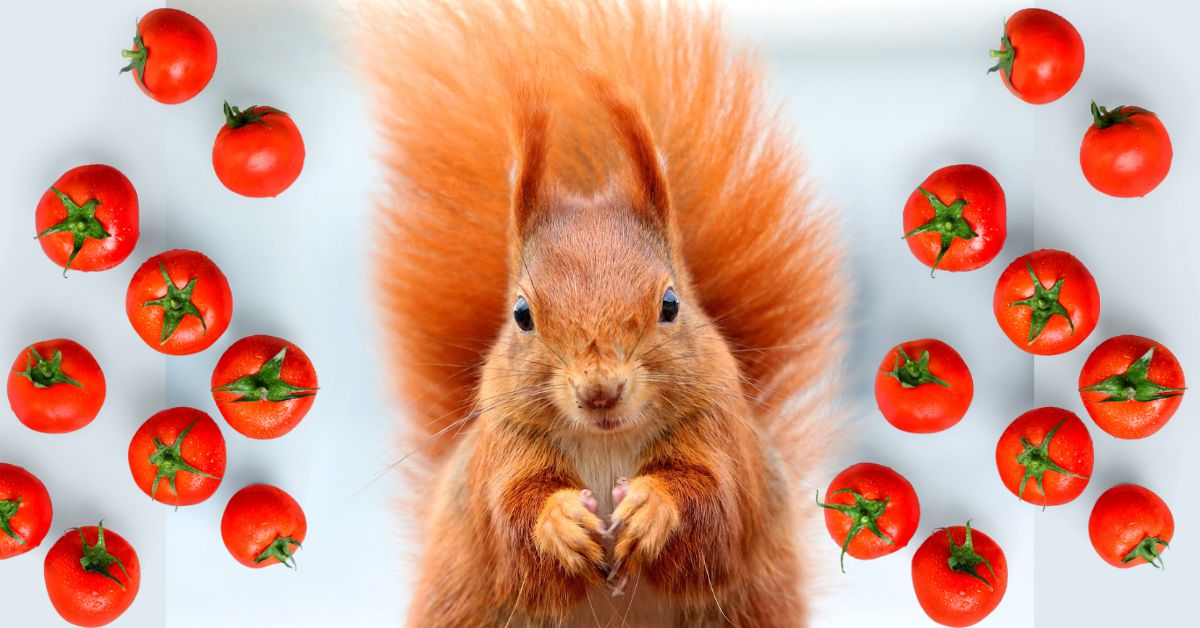
Squirrels may cause a lot of problems in the garden. Except for flying squirrels (which may be found in various locations across the country, including the East Coast and the Pacific Northwest), these rodents are active during the day.
Following signs that squirrels have visited your garden:
Planting beds with shallow digging areas. These aren’t great locations; you’re searching for holes the size of a golf ball or smaller.
Newly planted seedbeds attract squirrels because they like uncovering and eating the seeds.
Fruit with bite marks and/or missing. Squirrels will occasionally eat only a portion of tomato and leave the rest, while others consume the whole fruit.
Squirrels love beans, squash, cucumbers, and eggplants, among other foods.
Plants are missing. Seedling pieces may be discovered on the ground or may completely vanish. The same is true with perennial leaves.
Seedheads have been nibbled. Squirrels are attracted to sunflowers because they bite flat, maturing seedheads from the outer edges.
Container excavation. It’s most certainly a squirrel’s nut-hiding handiwork if your veggies, herbs, and flower pots are continually dug into (although chipmunks do the same thing).
Squirrels will occasionally come upon young potted plants while searching for nuts.
Flowers that have been eaten in part. Squirrels seem to favor daisies, but they do eat other flowers from time to time. So squirrels are eating in your yard if you notice half-eaten daisies with half the petals and much of the center disk missing.
Of course, catching a squirrel in the act is the best method to be sure you’re dealing with a squirrel. If you see any of these indicators while you’re at home, keep an eye on the garden.
How to Protect Tomato Plants From Squirrels?
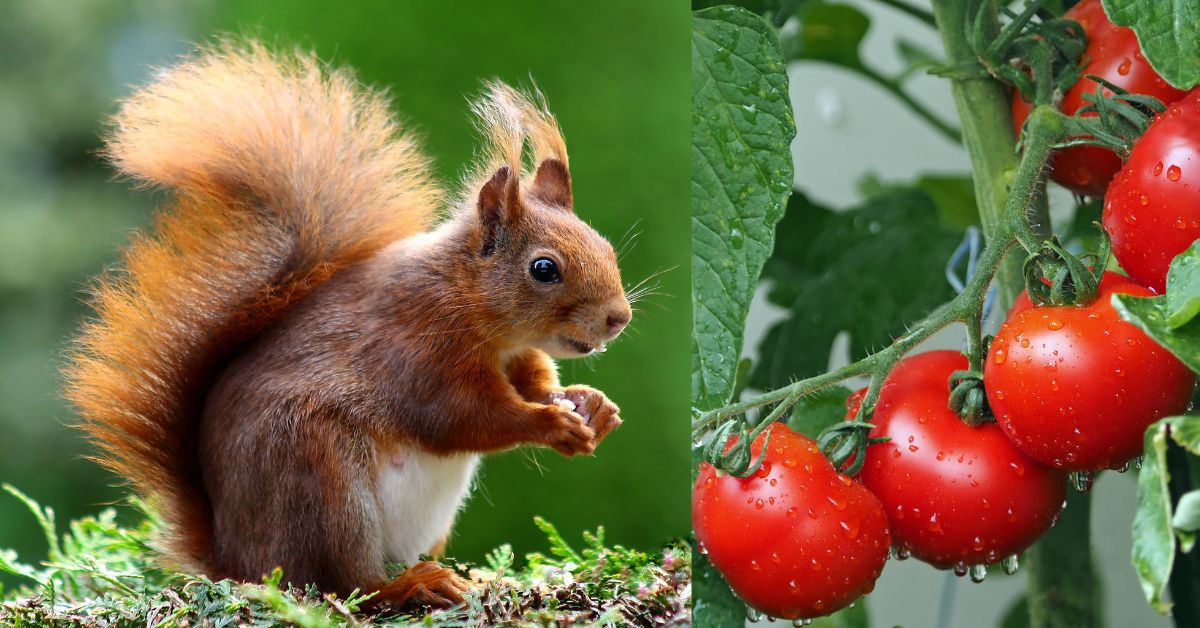
- The best way to keep squirrels away from your tomato plants is to create a barrier around them. For example, you can use chicken wire made into 1-inch squares and place them around your plants.
- Besides a fence, you can use predator decoys, often available at specialty hunting stores.
These decoys mimic a natural predator and cause the animal to run away. They can be placed in areas near your tomatoes and will scare the animals. - A dog is a good choice for keeping squirrels out of your garden. Many dogs have a natural instinct to chase after small animals and can be trained to avoid your tomato plants.
However, keeping them away from your plant may not be possible if your dog can’t stay near it all day. - Alternatively, you could try bird netting or other types of covers to protect your tomatoes from other animals.
Squirrel netting for tomato plants
One of the most effective ways to protect your tomato plants from squirrels is to use squirrel netting. Squirrel netting is a mesh material that covers your plants and prevents squirrels from reaching them. You can buy squirrel netting online or at garden centers, or you can make your own with chicken wire, hardware cloth, or plastic mesh.
To use squirrel netting, you need to create a frame around your plants with stakes, poles, or PVC pipes and then attach the netting to the frame with clips, ties, or staples. Make sure the netting is tight and secure, and leave some space between the netting and the plants to allow air circulation and pollination. Squirrel netting will not only keep squirrels away from your tomatoes, but also other animals like birds, rabbits, or deer.
Using bamboo for tomato stakes
Bamboo is a natural and sustainable material that can be used for tomato stakes. Bamboo stakes are strong, durable, and flexible, and they can support the weight and growth of your tomato plants. Bamboo stakes are also easy to find, cheap, and eco-friendly, as they are biodegradable and renewable.
To use bamboo for tomato stakes, you need to cut them to the desired length, sharpen one end, and insert them into the ground near your tomato plants. You can then tie your tomato plants to the bamboo stakes with twine, string, or cloth strips. Make sure the ties are loose enough to allow some movement and growth but tight enough to prevent sagging or bending. Bamboo stakes will help your tomato plants grow upright, healthy, and productive.
How to keep chipmunks from eating tomatoes
Chipmunks are another type of rodent that can cause problems for your tomato plants. Like squirrels, chipmunks are attracted to ripe and juicy fruits and will nibble on them or carry them away. Chipmunks are smaller than squirrels, but they can still do a lot of damage to your plants by digging up the soil, chewing the stems, or eating the seeds.
To keep chipmunks from eating your tomatoes, you can use some of the same methods that work for squirrels, such as physical barriers, natural repellents, or early harvesting. You can also try trapping and relocating chipmunks, but make sure you follow the local laws and regulations regarding wildlife. Chipmunks may look cute and harmless, but they can be a serious threat to your tomato harvest.
Repelling the squirrels using natural methods.
- You can place plants that contain strong smells around your gardens, such as mint or sage.
- You can also place a radio near your tomato patch on the soil to scare them away.
Make sure you use a sturdy fence. If you cannot access a gardening center, you can build a cage yourself. You should ensure the cage is made of sturdy fencing so that it won’t collapse. - Another best way to keep squirrels away from your tomato plants is to buy bird netting or a hardware cloth cage.
- You can also try spraying predator urine or garlic pepper.
Depending on where you live, this can help repel the squirrels. These two foods will make the squirrels afraid of the tomatoes, so the first step is to buy the repellent.
Nevertheless, you must remember that squirrels have developed a natural ability to recognize and identify predator scents. If you’re not prepared to use this method, you can always choose another method. - Another natural repellent that you can use to keep squirrels from your tomato plants is apple cider vinegar.
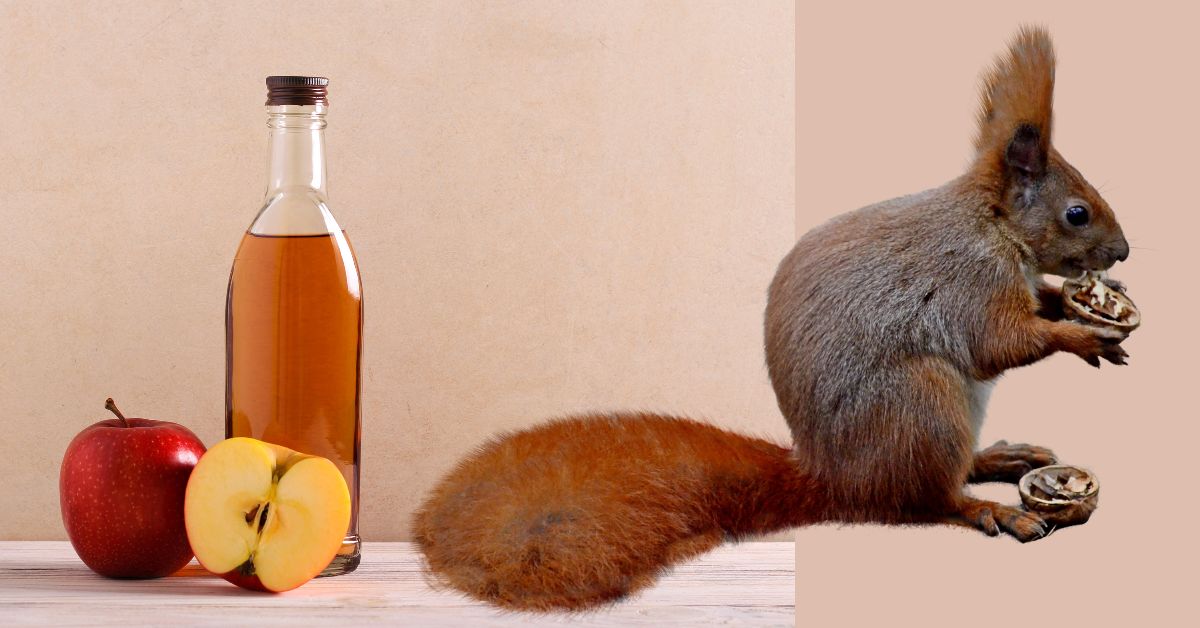
Unlike other methods, it will work long-term. Soak a rag in apple cider vinegar and place it around your plants. A rag will not only deter the squirrels from eating your tomatoes but will also help to prevent your tomatoes from rotting.
Conclusion
Protecting tomato plants from squirrels might seem like an impossible task, but with the right strategies in place, you can enjoy a bountiful harvest without sharing it with these furry thieves. Remember, prevention is key – so don’t wait until you notice damage to take action.
By incorporating some of the expert tips we’ve discussed in this article, such as using physical deterrents, natural repellents, or simply harvesting your tomatoes early, you’ll be well on your way to protecting your plants from squirrels and other critters.
So roll up your sleeves, put on those gardening gloves, and give these methods a try. Who knows, you may even discover a new favorite technique for keeping your tomatoes safe and sound. Happy gardening!”
FAQ
Will squirrels eat tomato plants?
Yes. When one of your planted tomatoes has a little bite mark on it, it’s likely that a squirrel has taken a bite out of it. Bushy-tailed squirrels are cute, but they can easily ruin your vegetable garden.
Do coffee grounds keep squirrels away?
Yes. The smell of coffee grounds may sometimes deter squirrels. However, they need regular restocking and may not be suitable for every location that has to be squirrel-proofed because of their specific requirements.
What is a natural squirrel repellent?
You may keep squirrels away from your property by utilizing unpleasant smells, such as capsaicin, white vinegar, peppermint oil, coffee grinds, cinnamon, predator urine, garlic, dryer sheets, Irish Spring Soap, or rosemary. Continue reading to find out more information about the odors that may be used to deter squirrels from entering your house and yard.
Does aluminum foil deter squirrels?
Placing strips of aluminum foil in your garden mulch may help repel squirrels and other pests by mimicking the sensation of having something between their teeth that they find unpleasant. Wrapping the trunk of the tree with aluminum foil is another option if squirrels are chewing the bark off of it.
Does orange peel deter squirrels?
Yes. Over the course of the winter, be sure to set aside enough orange and lemon peels to fill a large container. When it comes time to plant in the spring, bury the old rinds just below the surface of the soil so that they are visible. This will prevent the squirrels from digging them up.
